Newsletter SCNAT Dezember 2015
 |
||
|
|
NEWS
Tournee «Forschung live» erfolgreich beendetDas Programm rund um das 200 jährige Jubiläum der Akademie geht diese Tage in Graubünden zu Ende. Wir blicken auf eine gelungene Tournee mit zwölf Standorten in der Schweiz zurück. Die Einsichten in den Passantenzonen waren gut besucht und der direkte Kontakt mit den Forschenden vor Ort gab dem Auftritt eine persönliche Note. Einsicht Gestern: Holzpark Klybeck, Basel
|
|
|
|
AGENDA
15. Januar 2016, 8:30-17:00, UniS, Bern
SWIFCOB 16 «Macht Biodiversität gesund?» Die Biodiversität beeinflusst die Gesundheit von Tier und Mensch in vielfältiger Weise. Sie beeinflusst etwa das psychische Wohlergehen, das Immunsystem oder die Übertragung von Krankheiten. Könnten das Gesundheitswesen und der Naturschutz stärker voneinander profitieren? Die Tagung SWIFCOB 16 «Macht Biodiversität gesund?» informiert über neuste Forschungserkenntnisse und Initiativen und diskutiert mögliche Synergien zwischen der Erhaltung der Biodiversität und der Förderung der Gesundheit. Anmeldungen bis am 4. Januar 2016 24.-26. Januar 2016, Rigi-Kulm
Rigi-Workshop, where disciplines meet «Big answers from small packages: systems and synthetic biology of microbes» Der Rigi-Workshop 2016 wird sich im Grenzgebiet von Mikrobiologie, Systembiologie und Synthetischer Biologie bewegen. Mikroorganismen gehören zu den einfachsten bekannten biologischen Systemen und bieten eine vielfältige Plattform für verschiedenste Anwendungen; von der Entwicklung von Nanomaschinen über die Veränderung von Stoffwechselwegen bis zur Herstellung komplett synthetischer Genome. Doktorierende und Post-Docs, die an solchen Fragestellungen interessiert sind, haben hier die Möglichkeit, sich mit erfahrenen Wissenschaftlern und untereinander auszutauschen und zu vernetzten. Die Sprache des Workshops ist Englisch. Rigi Workshop 2016 15.-16. Februar 2016, Universität Lausanne LS2 Annual Meeting 2016 Interdisciplinary sciences Die Konferenz bietet eine breite Palette der Spitzenforschung der interdisziplinären Wissenschaft in den Bereichen der Naturwissenschaften (Molekular- und Zellbiologie, Physiologie, Proteomik, experimentelle Pharmakologie, Neurowissenschaften, Mikrobiologie, Pflanzenbiologie, chemische Biologie und vieles mehr). Detailliertes Programm 16 February 2016, Lausanne Research breakthroughs and social impact: young scientists debate synthetic biology Emerging technologies have the potential to offer new solutions for society's challenges but also raise concerns about safety and ethical implications. At this round-table, young scientists from different fields will discuss the possible impact of synthetic biology, a maturing scientific discipline aiming to modify, rebuild and design biological systems. This event is organized by the Forum for Genetic Research and LS2 and is part of the LS2 Annual Meeting. More information 8. April 2016, Bern Ethische und rechtliche Verantwortung in internationaler Forschung International tätige Forschende können mit schwierigen ethischen oder juristischen Fragen konfrontiert werden – etwa bei der Zusammenarbeit mit korrupten politischen Strukturen vor Ort, bei der Mitarbeit an aus zweifelhaften Ressourcen finanzierten Projekten oder bei der Zusammenarbeit mit Forschenden aus Ländern, die internationalen Sanktionen unterliegen. Mehr Informationen 17. April 2015 bis März 2016, Kulturama, Stiftung Museum des Menschen, Englischviertelstrasse 9, Zürich Körperbilder von Vesal bis zur virtuellen Realität Die interaktive Sonderausstellung bietet eine Reise ins Innere des menschlichen Körpers und zeigt die Entwicklung der Anatomie von der Renaissance bis heute. Objekte, anatomische Präparate, historische Werke sowie Abbildungen, die durch modernste bildgebende Verfahren erzeugt wurden, Videos und interaktive Stationen führen die Besucherinnen und Besucher durch verschiedene Epochen und wissenschaftliche Disziplinen. Zur Ausstellung im KULTURAMA 27. Mai 2016, Basel eco.naturkongress 2016: Welternährung und die Schweiz Der eco.naturkongress (ehemals NATUR Kongress) ist die schweizweit führende Netzwerkplattform für Nachhaltigkeit. Der Event wird jährlich von rund 700 EntscheidungsträgerInnen und Fachleuten aus Politik, Wirtschaft, Wissenschaft und Medien besucht. Mehr Informationen 7.–8. Juni 2016, Bern Anpassung an den Klimawandel in der Praxis Im Mittelpunkt der internationalen Tagung steht die Frage, wie nationale Strategien zur Anpassung an den Klimawandel vor Ort erfolgreich in die Praxis umgesetzt werden können. Regionen, Städte und Gemeinden stellen konkrete Beispiele aus verschiedenen Bereichen vor. Für den Austausch zwischen den Projekten und für die Vernetzung der Teilnehmerinnen und Teilnehmer werden vielfältige Möglichkeiten geboten. Die Tagung wird vom Bundesamt für Umwelt BAFU zusammen mit ProClim-, dem Forum für Klima und globalen Wandel der Akademie der Naturwissenschaften Schweiz (SCNAT) veranstaltet. Mehr Informationen 11.-15. Oktober 2016, Grassau, Deutschland AlpenWoche 2016: Alpen & Menschen. Gelebte Kultur! Die AlpenWoche ist eine internationale Veranstaltung zur nachhaltigen Entwicklung im Alpenraum. Sie findet alle vier Jahre statt und wird von führenden, alpenweit tätigen Organisationen gemeinsam ausgerichtet. Auf der AlpenWoche kommen die wichtigsten Stakeholder der Region zum Informations- und Meinungsaustausch in Vorträgen, Podiumsdiskussionen und Workshops zusammen. Mehr Informationen Kontakt und ImpressumBei Fragen und/oder Anregungen zögern Sie nicht, mit uns Kontakt aufzunehmen: Wenn Sie den SCNAT-Newsletter in Zukunft nicht mehr erhalten möchten, können Sie sich hier abmelden: www.scnat.ch/Newsletter
Akademie der Naturwissenschaften Schweiz (SCNAT) | Haus der Akademien | Laupenstrasse 7 | 3008 Bern
Pascal Blanc | Tel. 031 306 93 23 | www.scnat.ch
Bild: ETH-Bibliothek Zürich, Bildarchiv.
|
Call for Nominations: EuCheMS Award for Service 2015
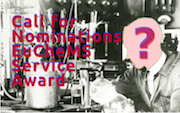 The EuCheMS Award for Service acknowledges outstanding commitment with regard to fostering chemistry and molecular sciences in Europe and the goals of EuCheMS. In addition to recognized service to EuCheMS, this may include activities in governmental, non-governmental or funding organizations, publicity-related activities, etc. Nominations must demonstrate achievements for improved competitiveness, visibility, coherence or structure of chemistry in Europe.
The EuCheMS Award for Service acknowledges outstanding commitment with regard to fostering chemistry and molecular sciences in Europe and the goals of EuCheMS. In addition to recognized service to EuCheMS, this may include activities in governmental, non-governmental or funding organizations, publicity-related activities, etc. Nominations must demonstrate achievements for improved competitiveness, visibility, coherence or structure of chemistry in Europe.
All EuCheMS member organisations, Divisions/Working Parties and individuals are invited to submit nominations for the Award. Self-nominations are not accepted.
Decisions on making the Award are taken by the EuCheMS Executive Board, normally annually.
It is normal practice that members of the Executive Board and Division Chairs are not considered for the Award until after their term of office has ceased.
Service as EuCheMS President or Treasurer or as Chair or other office holder of a EuCheMS Division is not itself sufficient to merit the Award.
The nomination must demonstrate service to EuCheMS and/or to European chemistry over and above the basic voluntary contribution that would normally be expected.
Unsuccessful nominations for the Award may be re-submitted once in the next three years from the first submission.
Please submit the nomination not later than 31 December 2015
David Spichiger, SCS
09.12.2015
SCS Award Winners 2016
It’s our pleasure to announce the winners of the 2016 SCS awards. We would like to sincerely congratulate all prizewinners and are looking forward to the ceremonies that will take place at one of your events during the next year.
Paracelsus Prize 2016
CHF 20,000 and medal in gold
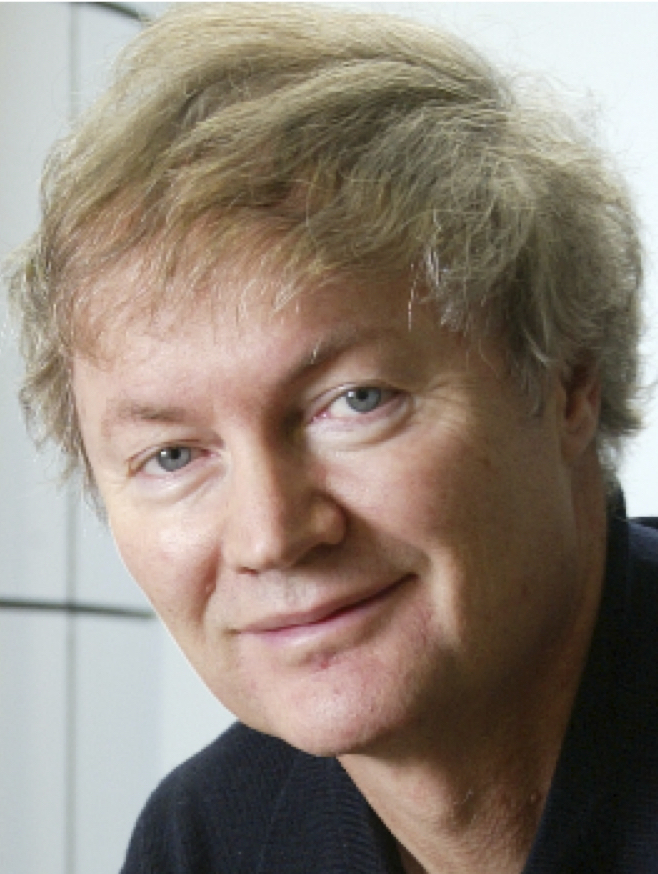 |
The SCS awards Prof. Michael Graetzel, EPF Lausanne, for his invention and development of the dye-sensitized solar cell. The prize if given on the occasion of the SCS Fall Meeting in Zürich on September 15, 2016. |
Professor at the Ecole Polytechnique de Lausanne, Michael Graetzel directs there the Laboratory of Photonics and Interfaces. He pioneered the use of mesoscopic materials in energy conversion systems, in particular photovoltaic cells, lithium ion batteries and photo-electrochemical devices for the splitting of water into hydrogen and oxygen by sunlight. He discovered a new type of solar cell based on dye sensitized nanocrystalline oxide films (Text from http://lpi.epfl.ch/graetzel).
Werner Prize 2016
CHF 10,000 and medal in bronze
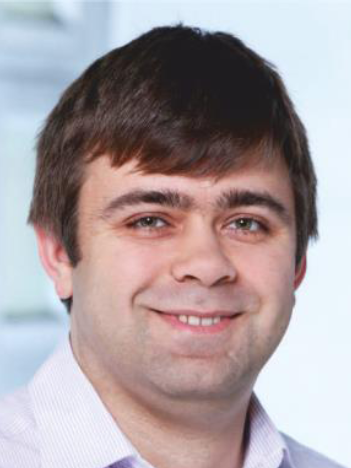 |
The SCS awards Prof. Maksym Kovalenko, ETH Zurich and EMPA Dübendorf for his innovative studies in the chemistry, physics and applications of inorganic nanostructures. The prize if given on the occasion of the SCS Spring Meeting in Zürich on April 22, 2016. |
Maksym Kovalenko has been an assistant professor (tenure-track) of inorganic functional materials at ETH Zurich since July 2011. He is also affiliated with Empa - the Swiss Federal Laboratories for Materials Science and Technology. The research activities of his group are carried out at both institutions (portrait text from http://www.old-lac.ethz.ch/kovalenkolab.html).
Sandmeyer Award 2016
CHF 20,000
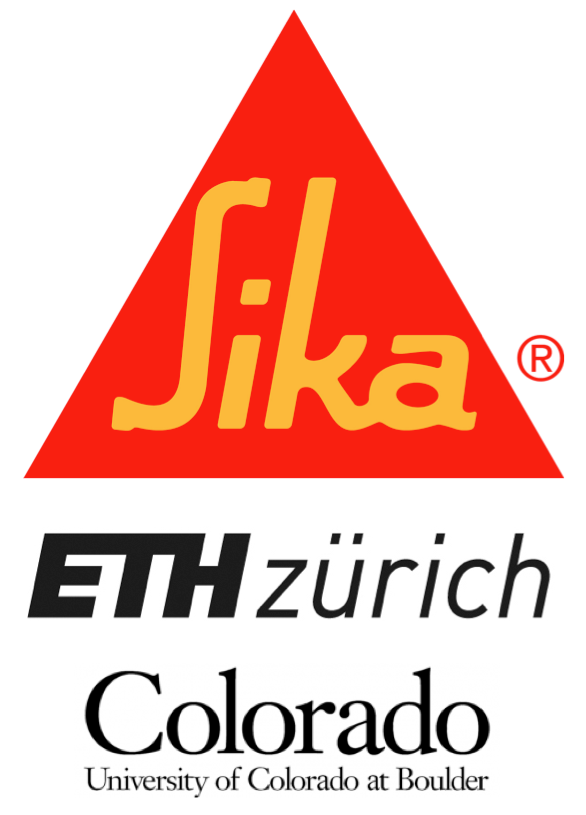 |
The SCS awards the team comprising researchers from Sika Technology AG, ETH Zürich and the University of Colorado Boulder, namely
|
for their experimental and modelling studies of new commercial organic additives for the grinding of inorganic solids.
The award ceremony takes place at the SCS Fall Meeting 2016 and the lecture is given on the occasion of the 13. Freiburger Symposium in Fribourg 2017.
Dr. Max Lüthi Award 2016
CHF 1,000 and medal in bronze
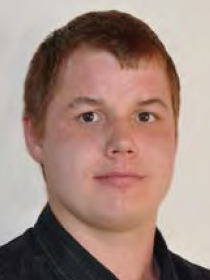 |
The SCS awards Mr. Flavio Gall, ZHAW Wädenswil, for his master his Bachelor Diploma Studies on the design and synthesis of cyclic metalloprotease inhibitors. The ceremony and the lecture takes place at the ILMAC-Forum in Basel on Fri, 23. September 2016 |
Berne, December 8, 2015
David Spichiger, Executive Director
Swiss Chemical Society SCS
/ www.scg.ch/awards
David Spichiger, SCS
08.12.2015
Chemistry Advent Calendar
Prepare for the holidays with this calendar of chemistry highlights covering, for example, candles, champagne, cinnamon, cookies, chocolate, and Santa Claus. There will be another article every day until December 24. Click the gift pack to open the calendar
If you are still looking for presents for the science fan in your life, view our list of science-themed presents recommended by Editors at Wiley and Wiley-VCH.
David Spichiger, SCS
01.12.2015
ILMAC 2016: September 21-23, 2016, Messe Basel
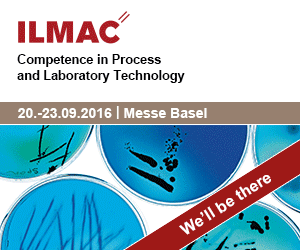 ILMAC, the Swiss fair for Process and Laboratory Technology
ILMAC, the Swiss fair for Process and Laboratory Technology
20 to 23 September 2016,
Messe Basel, www.ilmac.ch
Matchmaking made easy: whether research and development, piloting, engineering, production or disposal – ILMAC 2016 is the interactive network platform where you can present your process and laboratory technology solutions in a highly efficient manner.
Laboratory technology and process technology are being presented together for the first time instead of in separate sections: at ILMAC 2016, you can showcase your competences and solutions as an overall package. This will ensure you attract greater attention from the growing number of professional visitors who plan and implement their company processes holistically rather than individually
Focal Topics
ILMAC 2016 is being staged under the motto “ILMAC 4.0” with two focal topics that you, as an exhibitor, can take up in a targeted manner. The ILMAC Forum will be looking at these topics from different perspectives during the fair. And, at the popular Lunch&Learn events, recognised experts from industry will be having their say. Our communication in the run-up to ILMAC will similarly be highlighting the following central themes.
ILMAC 4.0: Boosting efficiency – an economic necessity
If the chemical and life sciences industry is to meet up to the economic requirements in future too, it will need to boost the efficiency of its processes and continually step up productivity while observing the highest quality standards. This will increase demand for new approaches, including particularly flexible processes and systems, automation solutions for the laboratory and for plant operation, and comprehensive global advice. And comprehensive product and employee safety must be guaranteed at all times.
ILMAC 4.0: Trends in state-of-the-art medicine call for new approaches in R&D and production
The trend in the health sector is towards personalised medicine with the corresponding diagnostic agents and specially-targeted individual therapy with highly potent drugs. The pharmaceutical industry and its suppliers must pay due heed to this situation. The research and production of powerful active ingredients and biopharmaceuticals calls for the appropriate safety precautions and high-precision processes. Present-day laboratories must be configured and equipped with the latest generation of information technology in such a way as to permit interdisciplinary cooperation across all the different boundaries. Producing personalised, highly-active drugs in a suppliable form requires flexible, readily adaptable production lines for small batches and frequent format changes.
David Spichiger, SCS
27.11.2015
Page 121 of 299



